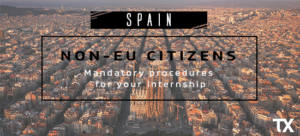
Mandatory procedures before to start your internship (non EU-Citizens)
If you are going to complete an internship in Spain and you do not have the nationality of an EU member state, make sure to read this article and know the mandatory procedures.
Do I need a visa?
Without a visa, you are entering Spain as a tourist and not as a student. That means that you officially can't stay for longer than three months and you can't get a salary, nor officially study or work: this goes for all EU countries.
Do I need a visa if I currently have a visa or a residence permit valid in another EU/Schengen country?
The answer is yes. If you have a residence permit for studies or a permanent residence permit in another Schengen country, that allows you to travel within the Schengen area as a tourist. However, neither document gives you the right to work or study in another Schengen country.
If you are going to earn a salary at the destination company, you will need a fiscal number (NIE) and a social security number. If you are not an EU citizen, you can't apply for the NIE without a residence permit valid in Spain.
Obtaining a residence permit for internships once you're in Spain is slow and the administration only accepts documents in the Spanish language. You can order a legal translation of all your documents but it is an expensive and lengthy process. Moreover, you never know whether your request will be accepted for a month. During this month (or probably even more), you can't earn a salary.
Remember that if you prepare the visa or the residence permit at the Consulate of Spain that is nearest to you (i.e., not in Spanish territory), they will accept and validate documents in English or the official language of the country. Further, they normally only accept to process your request when they know that you are going to receive the acceptance: 100% secure, cheaper, and faster.
What documents do I need to prepare a visa or a residence permit?
Remember that in the embedded Prezis in this text, you have a step-by-step guide to all the producers that you can watch. They explain all the information that appears on the official webpage of the Ministry of Labor, Migrations, and Social Security of the Kingdom of Spain. These are all the documents you will need as a non-EU citizen:
- The form of application to reside in Spain for studies (Application for National Visa), in duplicate, filled in, and signed.
- Valid passport or travel title with the minimum validity of the period for which the stay is requested, with all pages photocopied.
- Proof of availability of financial means necessary for the period requested and for the return to the country of origin (550€ per month):
- Sum of the grant and the salary you receive from the company must exceed €550 a month. If not, you must present a certificate from your bank account with the bank stamp.
- To demonstrate this, you must present your learning agreement (in Spanish), the financial agreement, the Presenter, and an acceptance letter in Spanish signed by the company where both amounts appear.
- Sum of the grant and the salary you receive from the company must exceed €550 a month. If not, you must present a certificate from your bank account with the bank stamp.
- Medical insurance document.
- A Health Card (public or private) with the standardized European format is sufficient.
- Otherwise, you will need the insurance policy, preferably in Spanish (talk with the insurance company).
- Documentation accrediting your status as a student admitted in another member state of the European Union:
- Your learning agreement.
- Document proving you're admitted to a teaching center in a full-time program leading to a degree:
- In the case of internships, you need the mentioned letter in Spanish signed by the company (we will provide you with such a letter).
- If the duration of the stay exceeds six months, you will also need the following:
- Medical certificate.
- Criminal record certificate issued by the authorities of the country of origin or the countries in which you have resided within the last five years.
Here is the step-by-step guide to preparing your residence permit/visa:
Are you going to stay for longer than six months?
So you will need to prepare the aforementioned Medical Certificate and Criminal records before applying for the international mobility for studies at the Spanish Consulate.
When you arrive in Spain, you will also need to get the Foreigner's ID Card (Tarjeta de Identidad de Extranjeros TIE) at the closest authorized police station.
How to get the Foreigner's ID Card (TIE) in Spain:
Here you have all the information from the official website of the Ministry of Labor, Migrations, and Social Security of the Kingdom of Spain.
First of all, you need the residence permit or the visa (D Class) for Spain.
Concerning the TIE, you will need to have filled in and printed the forms EX-17 and 790/12.
The 790/12 is a standardized form for paying taxes. In 2018 the cost was 15.60€ but this may be subject to change.
You must pay this tax in an ATM in Spain before going to the Police Station because you need to present the receipt.
Also, you need an official photo (the typical photo for ID cards, passports, etc.).
Here is the step-by-step guide to the entire process:
Are you going to receive a salary?
Normally, the answer is yes. In this case, you will need a Social Security Number (NUSS). If you have your visa for studies (D Class) or your residence permit ready, you already have a Spanish number for foreigners (Número de Identidad de Extranjero or NIE).
The name of the procedure in Spanish is "Asignación de Número de la Seguridad Social". You need to go to the closest Social Security Office "Oficina de la Seguridad Social" that can manage registrations. In the embedded Prezi you have how to find these offices. If you have a problem, just contact us.
What documents do I need for the NUSS?
Your TIE (Foreigner's ID Card) or visa and/or residence permit, always with the photocopy.
Your Learning Agreement (preferably in Spanish), always with the photocopy.
The second page of the form TA1 was completed and printed.
You don't need an appointment with the Social Security Office, but we recommend arriving by 9:00 to avoid long queues and waiting times.
Here is the step-by-step guide to the entire process:
If you follow these steps in all the procedures, you will not experience any legal or procedural difficulties during your internship. You will have the same rights in Spain as the Spanish students.




